居民对共享经济的创业动机、态度和行为意愿
IF 11
1区 管理学
Q1 BUSINESS
Journal of Hospitality Marketing & Management
Pub Date : 2023-02-14
DOI:10.1080/19368623.2023.2173351
引用次数: 5
摘要
摘要本研究探讨了印度居民对共享经济的创业动机、态度和行为意向之间的关系。本研究采用自我管理问卷收集定量数据。采用偏最小二乘结构方程模型(PLS-SEM)和模糊集定性比较分析(fsQCA)对上述关系进行二项式检验。PLS-SEM结果显示,托管满意度、社会互动满意度和独立性满意度正向影响居民对共享经济的态度。此外,社会互动、文化资本来源和招待满意度也对参与共享经济的意愿产生正向影响。此外,fsQCA结果表明,创业动机维度的几种配置产生了对共享经济的态度和参与共享经济的意愿。在此基础上,提出了若干理论和实践意义。本文章由计算机程序翻译,如有差异,请以英文原文为准。
Residents’ entrepreneurship motives, attitude, and behavioral intention toward the meal-sharing economy
ABSTRACT The present study explores the relationships between entrepreneurship motives, attitude, and behavioral intention of Indian residents toward the meal-sharing economy. The study implements a self-administered questionnaire to collect quantitative data. Partial least squares structural equation modeling (PLS-SEM) and fuzzy-set qualitative comparative analysis (fsQCA) were binarily performed to test the aforementioned relationships. The PLS-SEM results show that the gratification of hosting, social interaction, and independence positively impact residents’ attitudes toward sharing economy. Moreover, social interaction, source of cultural capital, and gratification of hosting also positively influence the intention to participate in the meal-sharing economy. Moreover, the fsQCA results demonstrate that several configurations of the dimensions of entrepreneurship motivations generate the attitude toward the meal-sharing economy and the intention to participate in the meal-sharing economy. Based on the results, several theoretical and practical implications were suggested.
求助全文
通过发布文献求助,成功后即可免费获取论文全文。
去求助
来源期刊
CiteScore
20.90
自引率
6.40%
发文量
33
期刊介绍:
The Journal of Hospitality Marketing & Management serves as a peer-reviewed platform dedicated to advancing understanding, practice, and education in hospitality marketing and management. It strives to foster the development of knowledge and theory by promoting new ideas, models, approaches, and paradigms. Embracing a multifaceted approach that spans administrative disciplines, liberal arts, and social sciences, the journal disseminates knowledge through high-quality, peer-reviewed research papers, reports, and book reviews. It stands as a unique forum for the community of students, academics, and practitioners who share a common interest and commitment to the field of hospitality marketing and management.

 求助内容:
求助内容: 应助结果提醒方式:
应助结果提醒方式:


